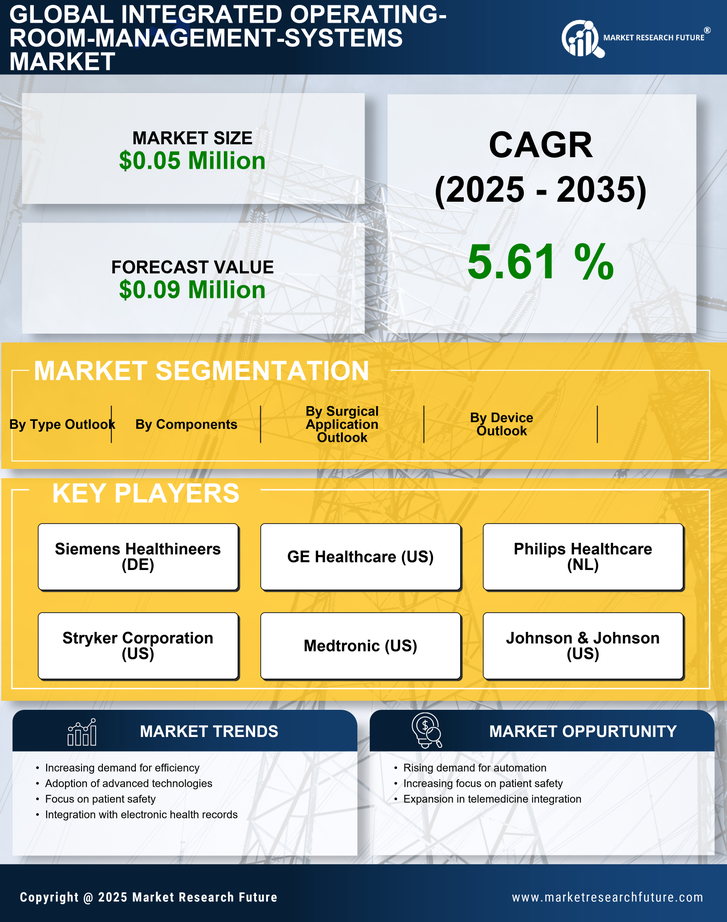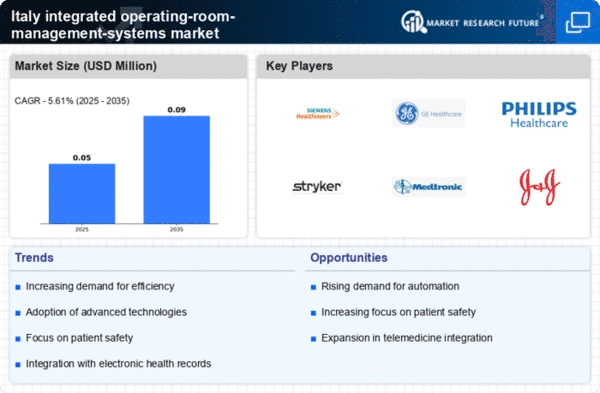Integration of Advanced Technologies
The integration of advanced technologies into the integrated operating-room-management-systems market is a key driver of growth in Italy. Innovations such as artificial intelligence, machine learning, and IoT are being increasingly adopted to enhance surgical planning and execution. These technologies facilitate real-time data analysis, enabling surgical teams to make informed decisions quickly. Furthermore, the Italian government has allocated €200 million towards digital health initiatives, which is likely to bolster the adoption of these advanced systems. As hospitals look to modernize their operating rooms, the demand for integrated solutions that incorporate these technologies is expected to rise, thereby propelling market growth.
Focus on Cost Reduction in Healthcare
Cost reduction remains a critical focus within the Italian healthcare system, influencing the integrated operating-room-management-systems market. Hospitals are under pressure to manage budgets effectively while maintaining high standards of care. Integrated systems that enhance operational efficiency can lead to significant cost savings by reducing waste and optimizing staff utilization. A recent report indicates that hospitals utilizing integrated management systems have achieved up to 20% savings in operational costs. This financial incentive is driving healthcare providers to invest in integrated solutions that not only improve patient outcomes but also contribute to overall cost efficiency.
Rising Demand for Surgical Efficiency
The integrated operating-room-management-systems market in Italy is experiencing a notable surge in demand for enhanced surgical efficiency. Hospitals and surgical centers are increasingly seeking solutions that streamline operations, reduce delays, and optimize resource allocation. This trend is driven by the need to improve patient throughput and minimize surgical wait times. According to recent data, the Italian healthcare sector has reported a 15% increase in surgical procedures over the past year, highlighting the urgency for systems that can manage these operations effectively. As healthcare providers strive to meet this growing demand, the integrated operating-room-management-systems market is positioned to benefit significantly from investments in technology that enhance operational workflows.
Regulatory Compliance and Quality Standards
The integrated operating-room-management-systems market in Italy is significantly influenced by the need for regulatory compliance and adherence to quality standards. The Italian healthcare system is governed by stringent regulations aimed at ensuring patient safety and quality of care. As hospitals strive to meet these standards, the demand for integrated systems that facilitate compliance is increasing. These systems provide tools for documentation, reporting, and monitoring, which are essential for meeting regulatory requirements. The emphasis on quality assurance is likely to drive investments in integrated solutions, as healthcare providers seek to enhance their operational capabilities while ensuring compliance with national and EU regulations.
Growing Emphasis on Data-Driven Decision Making
The growing emphasis on data-driven decision making is reshaping the integrated operating-room-management-systems market in Italy. Healthcare providers are increasingly recognizing the value of data analytics in improving surgical outcomes and operational efficiency. By leveraging data from integrated systems, hospitals can identify trends, monitor performance, and make informed decisions that enhance patient care. This shift towards data-centric approaches is supported by a 30% increase in the adoption of analytics tools within the healthcare sector over the past year. As the importance of data continues to rise, the integrated operating-room-management-systems market is likely to expand, driven by the need for solutions that facilitate comprehensive data analysis.

















